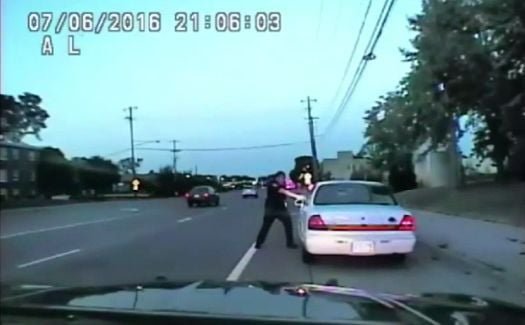PHOENIX — If the new language in Arizona’s driver’s license manual sounds like something written by Black Lives Matter, there’s a good reason for it.
The provisions tell motorists what to do if they’re pulled over by a police officer. They also provide specific warnings about what not to do, like reaching around in the vehicle or getting out.
The goal is pretty simple, said state Rep. Reginald Bolding, a Laveen Democrat who helped write the section.
It’s designed to keep drivers from getting shot by police.
Bolding, who is black, said the record shows that victims of police shootings during traffic stops are more likely to be black or Hispanic.
“When you look at what’s taken place across the country, you have seen a majority of individuals who are people of color that have had higher incidence of interactions with law-enforcement officers, particularly in shootings,” he said. “Hopefully we can get to a place where that’s not the reality.”
It was one such shooting of a black man — the 2016 killing of Philando Castile by a Minnesota police officer — that prompted Bolding to seek a rewrite of Arizona’s driving manual.
Officer Jeronimo Yanez pulled Castile over because a brake light was out. Castile told the officer he had a firearm on him, to which the officer said, “Don’t reach for it then.” Castile said he wasn’t pulling it out, but the officer fired seven rapid shots into the vehicle, striking Castile five times.
The incident was captured on the dash camera of the patrol car. Prosecutors charged the officer with one count of second-degree manslaughter and two counts of intentional discharge of a firearm that endangers safety. Yanez, who testified he feared for his life, was acquitted earlier this month.
In the wake of that incident, Bolding said he reached out to eight different police departments, asking them what motorists should do to avoid becoming victims.
“I got eight different recommendations,” he said.
Queries to various motorists on what they should do also produced inconsistent responses.
“Some people said you immediately reach into your glove department to grab your license and registration,” Bolding said. “Others said to turn on the dome light. Others said to wait.”
So Bolding brought together the Arizona departments of transportation and public safety in hopes of coming up with some good — and consistent — advice for drivers when they see flashing lights in the rear-view mirror.
“No one should ever leave a traffic stop in a body bag,” Bolding said.
“I recognize this won’t solve all officer-involved shootings,” he said. “I do hope that this could potentially save a life by giving a recommendation of what to do.”
The first piece of advice, obviously, is to find a safe place to pull over.
After that, the recommendations now included in the state manual for drivers say to park the car, remain in the vehicle, and for all occupants to keep their seat belts fastened. Motorists should keep their hands on the steering wheel in a visible location and wait for the officer to approach the vehicle.
Other suggestions include:
- Lowering the windows, especially if they are tinted;
- At night, turning on any overhead passenger compartment lights;
- Informing the officer if the driver has a weapon or if there are any in the vehicle.
Bolding said this last tip is particularly crucial in a state like Arizona, where any adult can carry a weapon, open or concealed.
“There has not been a lot of education on what individuals should do if they are carrying a gun,” he said. “We are a state that talks about the Second Amendment rights and we want individuals to have the ability to carry guns. But with that we also wanted to make sure that they’re protected and they’re not put in harm’s way.”
The new manual also includes warnings about what not to do.
One is to not reach around inside the vehicle.
“If you need to reach for an item, contact the officer verbally to indicate the item you need to locate and only do so after the officer has given verbal confirmation,” the manual now says.
Don’t get out of the vehicle unexpectedly or approach the officer.
Bolding said he wanted to make sure drivers knew what to expect, and what rights they have.
But he also cautioned against motorists getting carried away in demanding those rights, at least while they’re stopped at the side of the road.
“The stop may not be the best point in time to have that protest,” Bolding said.
Instead, the manual recommends that those who believe they’ve been mistreated contact the officer’s supervisor or agency, using information on the officer that’s listed on any citation issued.
Department of Public Safety spokesman Bart Graves, whose agency was involved in coming up with the final provisions, said he thinks the advice will help all involved.
“We consider these an outreach to assist drivers in understanding what can happen in a traffic stop,” he said.





